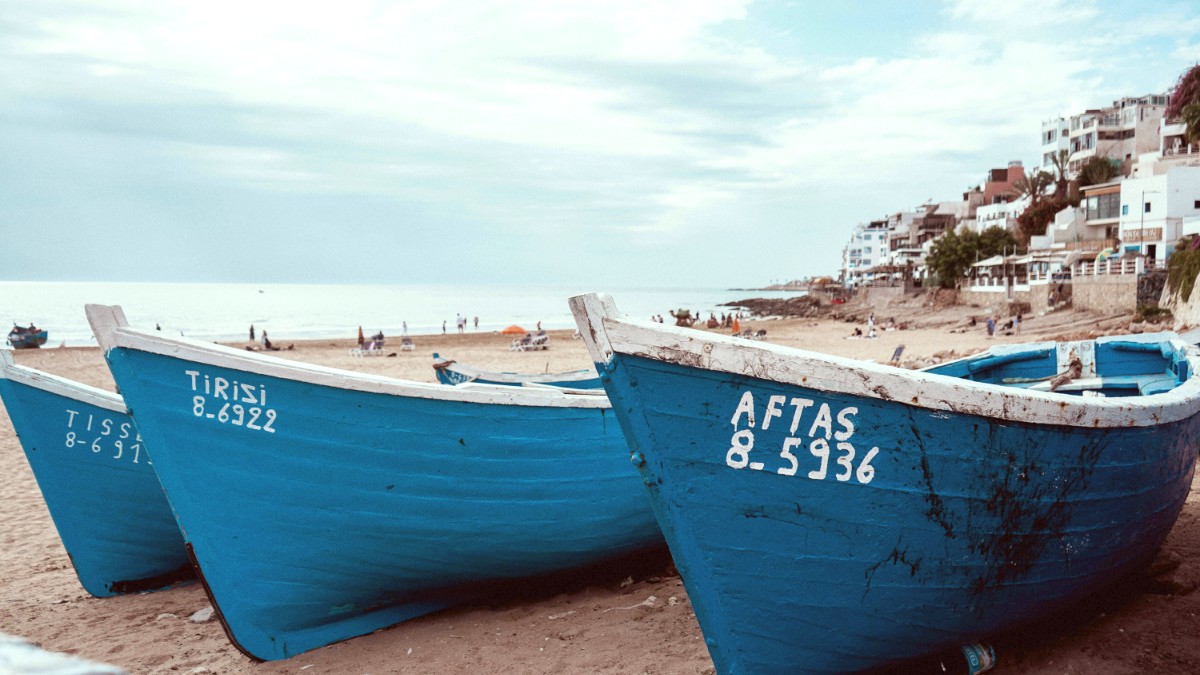
Morocco
Average daily temperatures show gentle fluctuation across seasons. In winter, from December to February, temperatures generally range from a comfortable 14°C (57°F) at night to a pleasant 20°C (68°F) during the day. Spring and autumn show even warmer conditions, with averages between 20°C and 25°C (68°F to 77°F).
Summer months, July and August, bring the warmest weather, with daily averages between 25°C and 28°C (77°F to 82°F), and occasionally higher peaks. The ocean breezes often temper the heat, making even the warmer months tolerable. Rainfall in Taghazout is minimal, mostly between November and March. Summers are very dry.
For overall balanced trips with good waves and pleasant weather, consider visiting in the shoulder seasons (May, June, or September). You experience comfortable temperatures, fewer crowds, and decent surf.
Whether you chase the perfect barrel or simply seek sunny beach days, the village welcomes you with its unique charm.
Busy for surfers
Consistent, large swells; pleasant daytime temperatures; lively atmosphere.
Higher accommodation prices; more crowded surf spots; cooler evenings requiring warmer layers like a Light jacket.
Good Balance
Good surfing conditions for learning; warm temperatures for beach; fewer crowds; lower prices.
Less consistent surf for experienced surfers; some businesses may have reduced hours.
Hottest, quietest
Hottest months, ideal for sunbathing, swimming; lowest prices; very few surfers.
Waves are generally smaller/less consistent; very hot for extensive activities; some surf schools may close.
Best for all levels with consistent waves: October to April. Best for beginners/small waves: May, June, July, August, September.
Beach and relaxation: May, June, September, and the hotter summer months (July, August) are ideal. Hiking and excursions: Cooler months from October to May are comfortable. Avoid intense hikes midday in summer.
Oct-Apr, for experienced surfers and larger waves.
May-Sep, for smaller, gentler waves, ideal for learning.
Warmest from May to September, ocean temperature warm.
Oct-May, for comfortable exploration of trails and valleys.
Stunning sunsets year-round; winter's low sun angle makes dramatic landscape shots.
A smooth arrival and departure depend on understanding Morocco's clear set of requirements for visitors from different countries.
Many nationalities do not need a visa for stays up to 90 days for tourism. This includes citizens of the United States, Canada, EU countries, UK, Australia, New Zealand, Japan, and most GCC countries. This simplifies travel planning.
If your country is not on the visa-exempt list, obtain a visa in advance. Apply from a Moroccan embassy or consulate in your country of residence before your trip. The process usually involves forms, photographs, and supporting documents.
Plan your travel and insurance needs with these trusted resources:
Taghazout, Morocco, welcomes budget-conscious travelers, mid-range explorers, and those seeking luxury. There are options for all.
The local currency is the Moroccan Dirham (MAD). Its value is generally stable. You cannot legally import or export Moroccan Dirhams, so plan to exchange currency upon arrival.
Exchange offices at airports and major towns offer competitive rates. ATMs are available in Taghazout village and widely in Agadir. Inform your bank of travel plans to avoid card suspension.
MAD 300-500 / $30-50 USD per day. Focus on dorm beds, street food, local transport, and free activities like beach time.
MAD 100-150 for dorm; MAD 100-150 for meals; MAD 20-50 for transport.
Limited comfort; less dining variety.
MAD 600-1000 / $60-100 USD per day. Enjoy private rooms, local restaurants, and occasional activities.
MAD 300-500 for private room; MAD 200-300 for meals; MAD 100-200 for activities.
Requires some budgeting for desired activities.
MAD 1200+ / $120+ USD per day. Includes upscale hotels, fine dining, private transfers, and personalized activities.
MAD 800+ for accommodation; MAD 400+ for meals; MAD 300+ for activities.
Highest cost for maximum comfort.
| Category | Range (MAD) | Examples |
|---|---|---|
| Accommodation (per night) | 80 - 1000+ | Hostel dorm (80-150), Basic guesthouse (200-400), Luxury resort (1000+) |
| Meals (per meal) | 10 - 250+ | Street food (10-30), Local restaurant (40-80), Upscale dining (250+) |
| Activities (per session/day) | 50 - 500+ | Wetsuit rental (50-100), Surfboard rental (80-150), Group surf lesson (250-400), Private surf coaching (500+) |
Morocco is generally a safe country for tourists, but awareness and readiness are always valuable.
Ensure all routine vaccinations are current (MMR, Diphtheria-Tetanus-Pertussis, Polio, Flu shot).
Hepatitis A and Typhoid are highly recommended. Consider Hepatitis B and Rabies for extended stays or rural travel. Consult a travel health professional 4-6 weeks prior.
Certificate only needed if arriving from a Yellow Fever risk country (check WHO list).
Traveler's Diarrhea
Drink only Bottled water or purified water. Avoid ice. Eat well-cooked, hot food. Peel fruits/vegetables. Be careful with street food. Carry Anti-diarrhea medication and rehydration salts.
Sunburn & Heatstroke: Use High-SPF, broad-spectrum sunscreen. Wear a Wide-brimmed hat, Sunglasses, and Rash guard. Stay hydrated.
Cuts/Scrapes from Surfing: Wear reef booties for rocky breaks. Clean cuts thoroughly with antiseptic and cover. Carry a Basic first aid kit.
Taghazout has basic clinics. Nearest full-service hospitals are in Agadir (Hopital Hassan II, Hopital Militaire).
Pharmacies are in Taghazout for common over-the-counter medications. Larger pharmacies are in Agadir.
Tap water not recommended. Drink bottled water or use a Personal water filter bottle. Choose clean restaurants; opt for hot, freshly cooked food.
Taghazout is generally very safe, with a low crime rate. The village atmosphere is relaxed and friendly.
Travel insurance is highly recommended. Ensure your policy has comprehensive coverage.
Medical emergencies, emergency evacuation, trip cancellation/interruption, and activity coverage (e.g., surfing).
Police (19 for fixed, 112 for mobile), Royal Gendarmerie (177 for rural), Ambulance/Fire Brigade (15).
Keep contact details for your country's embassy in Rabat or any closer consulates (e.g., U.S. Embassy in Rabat +212 537 637 200).